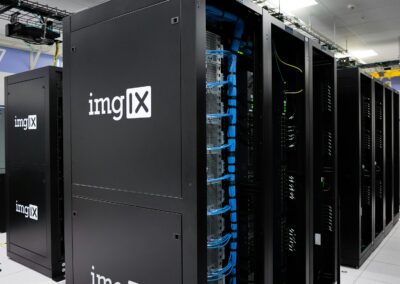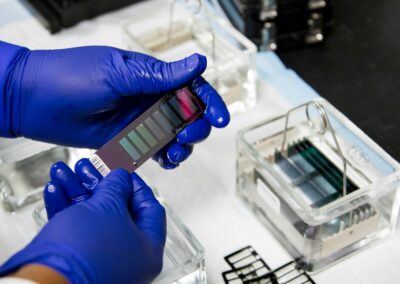Revolutionizing Large-Scale Biological Data Handling with Advanced Technologies
Understanding Molecular Computing and Its Application to Biological Data
Molecular computing for biological data management offers a transformative approach to storing and analyzing vast amounts of biological information. This innovative field leverages the principles of molecular biology and computer science to create new methods for handling data at the molecular level. In regions like Saudi Arabia and the UAE, where technological advancement and healthcare innovation are prioritized, molecular computing holds significant potential for enhancing data management in biomedical research and healthcare.
Molecular computing utilizes molecules, such as DNA and proteins, to perform computations and store information. By mimicking the natural processes of living organisms, molecular systems can handle data in ways that traditional silicon-based computers cannot. These systems are not only incredibly compact and efficient but also capable of operating in environments where traditional technologies may fail. In cities like Riyadh and Dubai, the integration of molecular computing into data management strategies could lead to significant improvements in research efficiency and healthcare outcomes.
The interdisciplinary nature of molecular computing is its greatest strength. By combining insights from chemistry, biology, and computer science, researchers can develop hybrid systems that leverage the best aspects of each field. This convergence allows for the creation of new algorithms, data storage methods, and analytical tools that can handle the complexity and volume of biological data more effectively than ever before.
Innovative Data Storage Solutions with Molecular Computing
The principles of molecular computing can be applied to develop novel methods for storing large-scale biological data. One of the most promising approaches involves the use of DNA as a data storage medium. DNA molecules have a high storage density, with the potential to store vast amounts of information in a very small volume. This makes DNA an ideal candidate for storing large datasets, such as genomic sequences, medical records, and research data.
DNA-based data storage works by encoding digital information into the nucleotide sequences of DNA molecules. This information can be read and retrieved using sequencing technologies, which decode the stored data back into a digital format. DNA storage is not only highly efficient but also extremely durable, capable of preserving information for thousands of years under the right conditions. In regions like Saudi Arabia and the UAE, where preserving historical and scientific data is crucial, DNA storage offers a robust and long-term solution.
Additionally, molecular computing can enhance the security and accessibility of stored data. By using molecular encryption techniques, data can be protected at the molecular level, making it highly resistant to unauthorized access and cyber threats. This added layer of security is particularly valuable in healthcare and biomedical research, where the protection of sensitive information is paramount. In Riyadh and Dubai, the adoption of molecular computing for data storage can ensure the integrity and confidentiality of critical data.
Advanced Data Management and Analysis with Molecular Computing
Molecular computing also offers new methods for managing and analyzing large-scale biological data. One significant advantage is the ability to perform parallel computations at the molecular level, allowing for the simultaneous analysis of multiple data points. This parallelism can greatly accelerate data processing speeds, enabling researchers to analyze large datasets more quickly and efficiently.
For example, DNA-based molecular computers can be designed to perform complex pattern recognition tasks, such as identifying genetic mutations or analyzing gene expression profiles. These systems can process and analyze vast amounts of genomic data in parallel, providing rapid insights that are essential for advancing personalized medicine and genomic research. In regions like Riyadh and Dubai, where precision medicine is a growing focus, molecular computing can drive significant advancements in diagnostics and treatment.
Moreover, molecular computing can facilitate the integration of diverse biological datasets, enabling more comprehensive and holistic analyses. By combining data from genomics, proteomics, and metabolomics, researchers can gain a deeper understanding of biological systems and disease mechanisms. This integrative approach can lead to the discovery of new biomarkers, therapeutic targets, and treatment strategies. In Saudi Arabia and the UAE, where cutting-edge biomedical research is a priority, molecular computing can enhance the ability to manage and analyze complex biological data.
Leadership and Management in Implementing Molecular Computing
Successfully implementing molecular computing for biological data management requires strong leadership and effective management. Leaders must foster a culture of innovation and collaboration, encouraging interdisciplinary research and the exploration of new technologies. This involves investing in continuous education and training programs to keep scientists and engineers up-to-date with the latest advancements in molecular computing and related fields.
Effective project management is also critical in navigating the complexities of developing and integrating molecular computing systems. Managers must ensure that projects are well-coordinated, with clear timelines, goals, and resource allocations. Implementing robust project management practices, including risk assessment and mitigation, is essential for overcoming technical challenges and ensuring the successful completion of molecular computing initiatives.
Furthermore, fostering partnerships with academic institutions, research organizations, and technology companies can provide valuable insights and resources. Collaborative efforts can accelerate the development of innovative solutions and drive significant advancements in molecular computing. In Riyadh and Dubai, where the technological ecosystem is vibrant and interconnected, leveraging these partnerships can lead to the successful adoption and implementation of molecular computing for data management.
The Future of Biological Data Management with Molecular Computing
The future of biological data management is poised for transformation with the integration of molecular computing. As research in this field continues to advance, molecular systems will become more sophisticated and capable, opening up new possibilities for data storage, processing, and analysis. In regions like Saudi Arabia and the UAE, where there is a strong commitment to technological innovation, molecular computing can play a crucial role in achieving national and regional scientific goals.
Generative AI, blockchain, and the Metaverse are among the fields that stand to benefit significantly from advancements in molecular computing. By integrating molecular systems with these technologies, researchers can create more secure, efficient, and scalable solutions for managing and analyzing biological data. This synergy will further solidify the role of molecular computing as a key driver of technological progress in Riyadh, Dubai, and beyond.
As molecular computing evolves, ongoing collaboration between industry, academia, and government will be essential. By working together, stakeholders can overcome technical challenges, develop innovative solutions, and ensure that molecular computing technology is integrated effectively into various sectors. Embracing molecular computing will pave the way for a future where biological data management reaches new heights of capability and efficiency.
Conclusion: Embracing Molecular Computing for Biological Data Management
In conclusion, molecular computing for biological data management offers a transformative approach to storing and analyzing vast amounts of biological information. By leveraging the principles of chemistry, biology, and computer science, molecular computing provides significant advantages in terms of efficiency, security, and scalability. For regions like Saudi Arabia and the UAE, investing in molecular computing research and fostering collaboration across scientific fields can lead to significant technological and economic advancements.
As molecular computing continues to evolve, its potential applications will expand, driving innovation in fields such as personalized medicine, genomics, and data security. By embracing this interdisciplinary approach, business leaders, researchers, and policymakers in Riyadh, Dubai, and beyond can position themselves at the forefront of technological progress, ensuring long-term success in an increasingly digital and interconnected world.
#MolecularComputing #BiologicalData #DataManagement #AI #ModernTechnology #BusinessSuccess #LeadershipSkills #ManagementSkills #ProjectManagement #SaudiArabia #UAE #Riyadh #Dubai #ArtificialIntelligence #Blockchain #TheMetaverse #GenerativeAI























